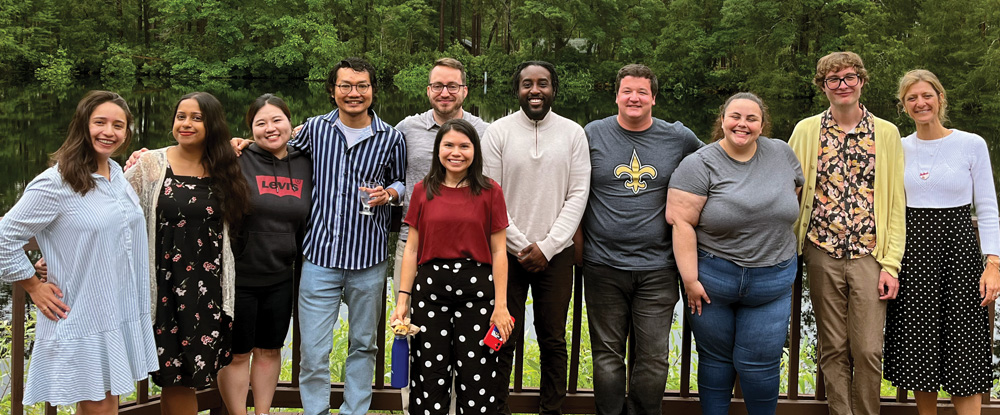The center hosted its second Graduate Humanities Summer Institute alongside its writing retreat at the UF Austin Cary Forest Campus. The institute was established as part of the center’s ongoing commitment to honing academic and professional versatility among graduate students in the humanities. Honoring this commitment, 11 doctoral students from various disciplines were invited to partake in a week of workshops, writing sessions, and small group discussions centered around this year’s theme: learning how to communicate the value of their humanities research within and beyond academia.
Throughout the week, participants were asked to address the fundamental question: “What is the value of humanities research and why?” To answer this, the cohort engaged in exercises designed to enhance their advocacy and communication skills, including developing presentations for the UF Three Minute Thesis (3MT ®). 3MT ® is a research communication competition designed to help students enhance their presentation skills and communicate their research to a non-academic audience. At the end of the week, participants delivered a three-minute research pitch and received feedback from peers and keynote speaker, Leonard Cassuto. As a result, each student gained a deeper awareness and understanding of graduate research’s significance in the humanities.
New Perspectives
“The exercises and activities prepared by the Summer Institute helped me better understand my own research. I left with a set of skills and broader perspective than I came up with. I highly recommend the program to anyone even mildly interested.” — Marcus Davis, Philosophy
“The Graduate Humanities Summer Institute helped me gain skills in communicating my own research to those outside of my field and the general public. Writing sessions, focused on adapting project descriptions into plain language and emphasizing the broader impact of my research, led to a better understanding of the importance of basing research on larger human questions. The most beneficial component was the constant peer review and expert feedback from faculty and our keynote speaker, Len Cassuto.” — Tony Farace, Anthropology
“The Graduate Humanities Institute has fostered an incredible learning environment and sharing space for emerging scholars. It has gifted me the courage to speak about my research in public, which was a daunting task for me previously, and has helped me connect with peers and mentors who have been absolutely motivating and caring. I am looking forward to participating in 3MT competition this Fall because of the mentorship and training I received at the Institute.” — Dinalo Chakma, English
Leonard Cassuto
Leonard Cassuto, renowned scholar and author of “Academic Writing as if Readers Matter,” delivered a lecture themed after his book at this year’s writing retreat and the Graduate Humanities Summer Institute. Drawing on material from his book, Cassuto explored the fundamental principles of writing that prioritize readability and reader engagement. He emphasized the importance of making academic work accessible and compelling to a diverse audience, highlighting techniques to sharpen arguments and clarify complex ideas.
On the first day, Cassuto gave a public lecture in which he offered tips on building and presenting finely tuned arguments in academic and research-based writing. He spoke of the importance of storytelling and making a connection with the reader in order to make complex ideas more understandable.
The second day featured a workshop where students received individual advice on how to present their research to non-experts. Students prepared their presentations and received immediate feedback from a mock committee that included Cassuto. After two hours of intense preparation, each participant received Cassuto’s one-on-one support and valuable advice.
Throughout his engagements, Cassuto underscored the power of storytelling and metaphor in enhancing the appeal of scholarly prose and cautioned against the misuse of jargon, which can alienate readers. He provided examples of effective communication in academia, highlighting how humanities researchers can ensure that their work connects with those interested in engaging with their research.
